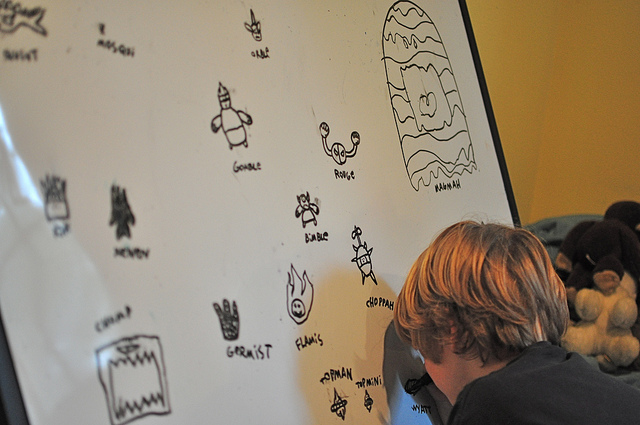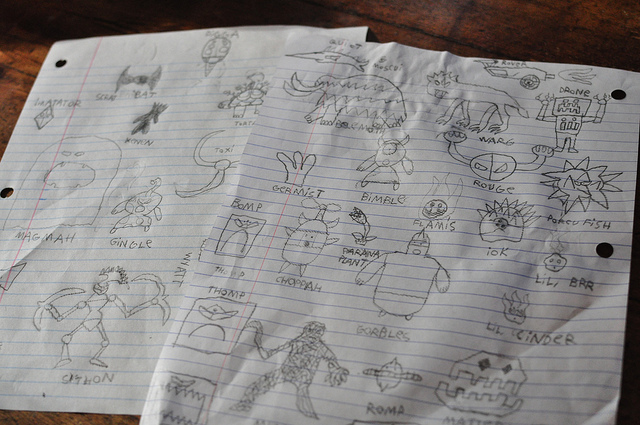
I came upon this quote the other day from Jeffrey Wilhelm, a professor of English Education who has written several books on kids and writing:
“Students now need more time to immerse themselves in curricular topics, more time to read, write, and reflect; they need more informal writing, they need more exploration, and they need to do things that really matter to them…When I refer to informal writing, I mean writing that is used to explore and express, writing that is for trying things out, for bricolage, for practice that is risk free, where taking chances is encouraged and rewarded.”
Hard as it is, I’m going to completely ignore the fabulousness of the quote in general and focus on that one little word that glittered in the middle of the paragraph, calling for my attention: bricolage.
I didn’t know what it meant, but I was intrigued. So, word geek that I am, I looked it up.
My gargantuan “Compact” Oxford English Dictionary–ten volumes in one, to be read with magnifying lens!–didn’t list it. But Wikipedia did.
“Bricolage (pronounced /ˌbriːkɵˈlɑːʒ/ or /ˌbrɪkɵˈlɑːʒ/) is a term used in several disciplines, among them the visual arts and literature, to refer to the construction or creation of a work from a diverse range of things that happen to be available, or a work created by such a process.”
Interesting.
“The term is borrowed from the French word bricolage, from the verb bricoler, the core meaning in French being, ‘fiddle, tinker’ and, by extension, ‘to make creative and resourceful use of whatever materials are at hand (regardless of their original purpose)’.”
Ooh, fiddling and tinkering! Two favorite verbs! And you know I like the idea of making creative and resourceful use of things…
“In contemporary French the word is the equivalent of the English do it yourself, and is seen on large shed retail outlets throughout France. A person who engages in bricolage is a bricoleur.”
Leave it to the French to have such a poetic way to say DIY.
But it was reading the rest of the entry, and the wildly diverse examples used to define bricolage that really blew my mind. Listed there is Michel Gondry, who happened to be one of the first filmmakers to captivate H., with his eye-exploding visual style. (And how I love Eternal Sunshine of the Spotless Mind!) There’s Seymour Papert, whose ideas about kids and computers and learning captivated me years ago. The term is also used in biology, cultural studies, philosophy, information technology. There’s mention of instruments made from tea chests, and Improv, and how the safety pin became the symbol for punks. Oh, and MacGyver is mentioned as “the paragon of a bricoleur.”
All references to one word.
One minute I didn’t know the meaning of the word; a few minutes later I realized that it’s a concept I embrace in education. There’s little I love more than watching my kids take bits from their worlds and craft them into something new and utterly unique to them. The other day, Mr. T was sketching a crowd of characters for a new story he’s been dictating.

I asked where he got the ideas for his characters.
“Oh, Mario Galaxy. And Medieval myths. And nature. And Artemis Fowl. And Egyptian myths. And Pokemon. And…”
Made my heart sing. Maybe bricolage should be the ultimate learning mode for the post-modern kid. Kids do it naturally, but it might be useful to point out when they’re using bricolage, and help them see the value in it. There’s so much information out there and accessible these days: the thinkers and shakers of the future will be the ones who can pull it all together and make something compelling of it. Remember Daniel Pink, and his sense of symphony? Or that quote from Michael Chabon that I love, from his Lego essay?
“Time after time, playing Legos with my kids, I would fall under the spell of the old familiar crunching. It’s the sound of creativity itself, of the inventive mind at work, making something new out of what you have been given by your culture, what you know you will need to do the job, and what you happen to stumble upon along the way.”
May our kids all become paragons of bricolage. Bricoleurs for the 21st century!
(Last night we watched Micmacs, a film by yet another wildly visually-inventive filmmaker, Jean-Pierre Jeunet. He also made Amelie, which I adore. This particular film revolves around a troupe of bricoleurs –actual French ones–who live in a trash dump. If you like creative, visually stunning films, this one will fascinate you. Isn’t it crazy how once you stumble upon an idea that’s new to you, it suddenly keeps showing up?)

Oh, my–I have been overusing that word in my poetry since I discovered it several years back. What a good one!
And I was just thinking about how to get students in my college-level, intro Creative Writing course to accept the fact that I don’t grade their poem/story drafts and that I don’t even comment on the writing they do in their journals all semester; I want them to get that I’m not lazy, that I really think they need to write no-stakes and low-stakes pieces almost daily in order to grow. I might just bust out “bricolage” on them, now you mention it! Thanks! 😉
Or tell them that some crazy blogging lady you know has been doing all sorts of research on writing in high school and college classrooms, and all the best writing educators recommend precisely what you do.
Throw this quote at them, from Thomas Newkirk:
“…the balance needs to be shifted–more writing on the part of the student, and less (or more selective) response from the teacher to each piece of writing. It may seem heretical to make this claim, but I am convinced that we overvalue feedback and undervalue practice–and in doing so have created a purgatory for diligent writing teachers. Volume, to be sure, does not equate with quality, but young writers can’t get to quality without volume. The good writers I see in college have often developed their skill in self-sponsored writing projects like journals or epic, book-length adventure stories they wrote on their own.”
Hallelujah! Sounds like you’re in good company.
Love it.
You piqued my attention with the post-modernist utterance–perhaps one of several theoretical corner stones for your upcoming book, although your home schooling pedagogy may lean more toward a post-modernist critique and advocate something less theoretically encumbered (i.e., free selection/choice vs. multicultural ‘indoctrination’).
Oh, that’s just me tossing off terms I don’t really understand in a meager attempt to be funny.
Go ahead and substitute “new millenium kid” into that sentence. That’s what I really meant.
Then again, if misusing terms is what it takes to make you come back and comment, Sam, maybe I’ll just keep up my rambling.
🙂
P.S. Especially loving the quote by Jeffery Wilhelm. I’m stewing about the recent article by Amy Chua in the Wall Street Journal.
See: Wall Street Journal January 8 Why Chinese Mother’s Are Superior
http://online.wsj.com/article/SB10001424052748704111504576059713528698754.html
What an article! I guess it’s obvious that I’m pretty far on the other side of the fence from the author. (And I think Jeffrey Wilhelm is over there with me.)
i think the dunham’s should change their last name 🙂
Molly Bricoleur. I like it!
I have only heard the word in the DIY sense. I love the richness of the definitions you dug up. I will be adding that word to my sensibility as it certainly sums up the way we live and create. It is all about making connections between disparate things. I just watched Micmacs too! And am a huge Jeunet fan. I even taught Amelie in my intro to humanities class a few years ago. I was in Paris the summer it came out and it was a huge hit. People were standing and applauding after it was over (apparently not normal in France). Thanks for a great post today! My morning brain has been sparked 🙂
Oh, to see Amelie in Paris! That’s one for the bucket list.
Sparking fellow brains is high praise in my book!